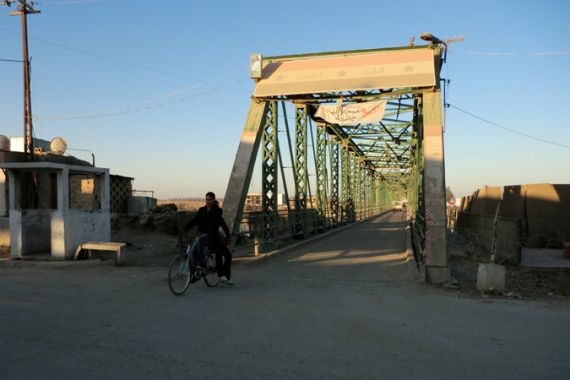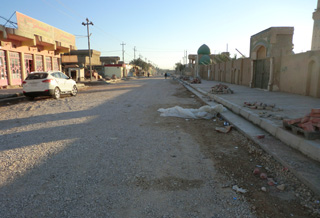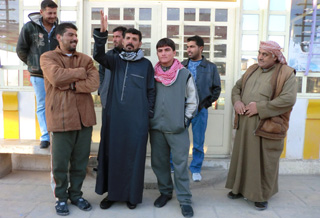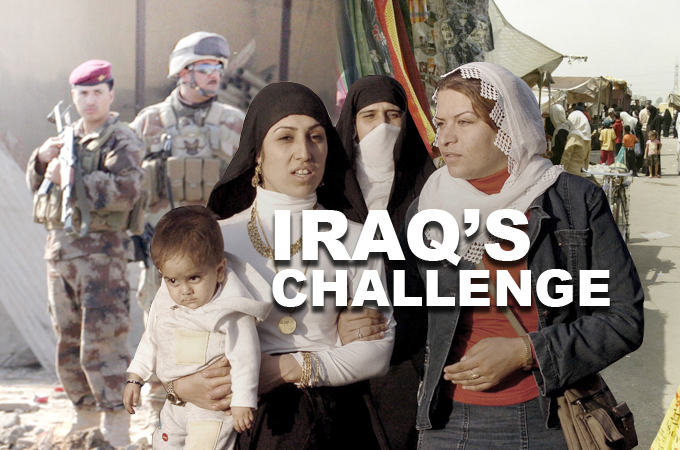Seven years after sieges, Fallujah struggles
With their city largely destroyed by two US military assaults, residents of Fallujah continue to suffer.

 |
| Many of Fallujah’s buildings that were damaged or destroyed in 2004 remain in disrepair [Dahr Jamail/Al Jazeera] |
Fallujah, Iraq – Fallujah still bears the scars of war; skeletons continue to be pulled from the rubble of bombed buildings, and, worse, rates of birth defects and childhood malformations have skyrocketed.
There is evidence of reconstruction, but shortages of electricity and clean water remain prevalent. The overall mood in the city is one of anger, hopelessness, and fear.
In April and November of 2004, the United States military launched two massive military sieges against the city of Fallujah, located 60km west of Baghdad, due to on-going resistance there against the occupation.
Doctors at Fallujah General Hospital told Al Jazeera in 2004 that 736 Iraqis had been killed during the April siege. They said approximately 60 per cent of the victims were women, children, and elderly, and told of medical personnel being fired on by US forces while trying to evacuate the wounded.
By the end of nearly three weeks of heavy bombings and a ground invasion in the November siege, more than 1,000 Iraqis were killed, according to Fallujah doctors.
‘Everything here is bad’
Most of the residents of the city of 300,000 had been displaced from their homes at that time, and while most have returned, thousands remain homeless, unemployed, and struggle to rebuild their lives.
It is estimated that 70 per cent of the buildings and homes in Fallujah were damaged or destroyed, along with at least 100 mosques, 6,000 shops, and nine government offices.
The Nazzal quarter of Fallujah bore the brunt of both sieges. Most of the streets were destroyed by US bombs and tanks. Today, they are dusty dirt roads strewn with garbage.
 |
| It is estimated that 70 per cent of the buildings and houses in Fallujah were damaged or destroyed, along with at least 100 mosques, 6,000 shops, and at least nine government offices [Dahr Jamail/Al Jazeera] |
“We fear what is coming,” Yassir Faisal, who has worked several years as a Reuters cameraman and lives in Fallujah told Al Jazeera. “Clerics here started warning people that after the US withdrawal the Iranian troops may come, and they will be worse than even the Americans were.”
Faisal said that he knows that the Iraqi resistance that remains in Fallujah are “well prepared and waiting for what is coming”. His warnings may be an ominous sign of things to come, as more Sunnis are leaving mixed neighbourhoods in Baghdad to move to places like Fallujah.
Mahir Khudair, a policeman, told Al Jazeera he felt things were “good” in the city despite the near-daily killings that occur.
“Recently in Gharma we had four policemen killed by an IED [Improvised Explosive Device],” Khudair said.
Another policeman standing nearby, who spoke on condition of anonymity, disagreed.
“We are losing two to three of us each day,” he replied to Khudair.
He held up his hands and asked: “What is good about our situation? Assassinations and bombings happen all the time, and the reconstruction is mostly bad!”
Ayad Hadi, a bakery worker, agreed.
“Everything here is bad,” Hadi told Al Jazeera. “No water, no electricity, no good health care. We have between 75 and 80 per cent unemployment. Widows have no rights, no compensation.”
Hadi described the mood in the city as “a general attitude of depression and hopelessness.”
“The government is busy trying to keep power, and they’ve forgotten the poor people,” he said.
“We used to have a poor, middle class, and rich class. But, now, there are only the rich and the poor. That’s why I have no hope for this country or for the future.”
Jassim Fakhri, an 18-year-old student, was 10 years old during the 2004 sieges.
“The last seven years have been hard,” he said. “My family and I fled during the sieges then returned after. There are no jobs now, so I’m doing day labour.”
Although most of the police in Fallujah are locals, most of the Iraqi military operating in and around the city is from southern Iraq.
During the 2004 sieges, Shia militiamen in the Iraqi army fought alongside the US military. This raised sectarian tensions in the predominantly Sunni city that continue to this day.
Faisal explained that, despite its problems, he believes Fallujah is safer than Baghdad.
“As Sunnis, we consider Fallujah much safer than Baghdad, but there are still assassinations of police nearly every day,” he said. “We have some people here in the Dawa party and connected to [Prime Minister Nouri al-Maliki] and that’s a problem.”
Resistance continues
Contributing to instability in the city are armed groups that continue to operate inside and outside the city.
In 2004 Fallujah became known as the city of resistance, since for a time it was the only unoccupied place in Iraq. Residents and resistance fighters fought hard during the two US sieges to defend their homes and their cities, causing Fallujah to be seen throughout much of the region as a symbol of resistance to American hegemony.
A resistance fighter who asked to be referred to as Ahmed said his movement is growing in Fallujah. He said it will continue to launch attacks against the on-going US presence in Baghdad.
Ahmed, who fought against occupation forces during both of the US attacks on Fallujah in 2004, said that resistance continues because “what the Americans left us is an Iranian occupation”.
“We learned not to trust the words and promises of the Americans,” he said. “They say they left, but have over 10,000 people at their embassy. This means they have not left our country.”
 |
| Fallujah residents are still angry about the on-going lack of adequate reconstruction, which causes many to remain without clean drinking water, electricity, and jobs [Dahr Jamail/Al Jazeera] |
According to Ahmed, there are several brigades of 80 fighters each still in Fallujah. He said if you include the number of intelligence, support, and logistics members “we have a very large number”.
“Right now, we only operate against the American forces, until they truly withdraw,” he added. “After that, we hope that what came with the occupation will leave with the occupation, whether they be Iranian, or politicians. The Iranian occupation is the child of the American occupation.”
Another fighter, Abu Abdullah, explained that their groups remain well armed, and have “plenty of ammunitions” for roadside bombs, and other types of “heavy artillery”.
He, like Ahmed, fought against the Americans during both Fallujah battles, and says their battle continues.
‘’No one should be disillusioned that the resistance has ended or defeated,” he said. “They say there are leaving … we doubt that … but if the Americans don’t leave we will continue fighting them. We will also fight the Iranian occupation, their supporters, and anyone who helps them stay in Iraq.”
Reconstruction falls flat
One re-construction project promised in the wake of the US siege of the city was a new hospital.
The new Fallujah General Hospital, in the city’s Dhubadh district, was completed in 2008. It is a larger, more modern version of its former iteration.
Still, this appears to be an exception to what most residents believe to be a rule of failed reconstruction projects in the city. Fulfilment of promises to rebuild destroyed schools, homes, mosques, and government buildings often remain only promises.
The Coalition Provisional Authority, the US civil administration created during the first year of the occupation, initiated the project and promised the plant would be a centerpiece of the US reconstruction effort in Iraq.
As of September 2011, the project has cost $107.8m, nearly four times more than originally planned. Although it is operational, it only connects 6,000 homes, approximately 38,400 people, and is still not complete.
There are plans for Baghdad to finish the project, which will cost an additional $87m and take three more years to complete.
Given how other projects taken over by Baghdad have largely failed to be completed, the wastewater treatment plant in Fallujah looks likely to become yet another symbol of another broken promise made by US authorities.
In late 2004, US and Iraqi officials launched a compensation campaign for the city.
Fawzi Mudhen, deputy head of the reconstruction committee formed at the time, said the compensation to residents was “almost fair”, though it overlooked the extensive damage caused to the city’s infrastructure.
Of the $1bn allocated for compensation, Mudhen said half of the $500m destined to affected homeowners was paid, but only $100m out of $500m for infrastructure was spent.
Two of the highlighted reconstruction projects were a water purification plant and a wastewater treatment project launched in 2004. Seven years later, the sewage system remains unfinished and the future of the project is uncertain.
Despite Baghdad allocating $100m for the city’s reconstruction and $180m for housing compensation, very little reconstruction can be seen on the streets of Fallujah.
Lack of electricity, clean drinking water, and properly functioning sewage systems continue to plague thousands of homes.
“The Americans didn’t bring us anything good,” Ahmed Hussein, a taxi driver, told Al Jazeera. “Most of us are jobless, and we are fighting to make a living.”
Barakat Yassin, a day labourer, had his home destroyed by the US military during the second siege.
“We have not received help,” he explained. “The Americans kicked us out of our house and took it as a headquarters, and then they levelled it with bombs when they left. We are today living in a rented house.”
 |
| Follow Al Jazeera’s Special Coverage |
Yassin, speaking with Al Jazeera as many residents looked on, found everyone agreeing with his statements as he continued.
“As a city, we only have two hours of electricity per day, three if we’re lucky,” he said as others nodded. “Our water is not clean. Mostly we drink bottled water.”
Another man, who asked not to be named, added that government security forces regularly enter Fallujah and “cause problems”. Three months ago, they detained so many people. They raided houses and claimed they were searching them, but they were just looting.”
Yassin added, “We hope things will improve, but things only get worse each year.”
The wastewater treatment plant that was promised the city of Fallujah after the April 2004 siege has yet to be completed, and stands as an example of what angers so many residents.